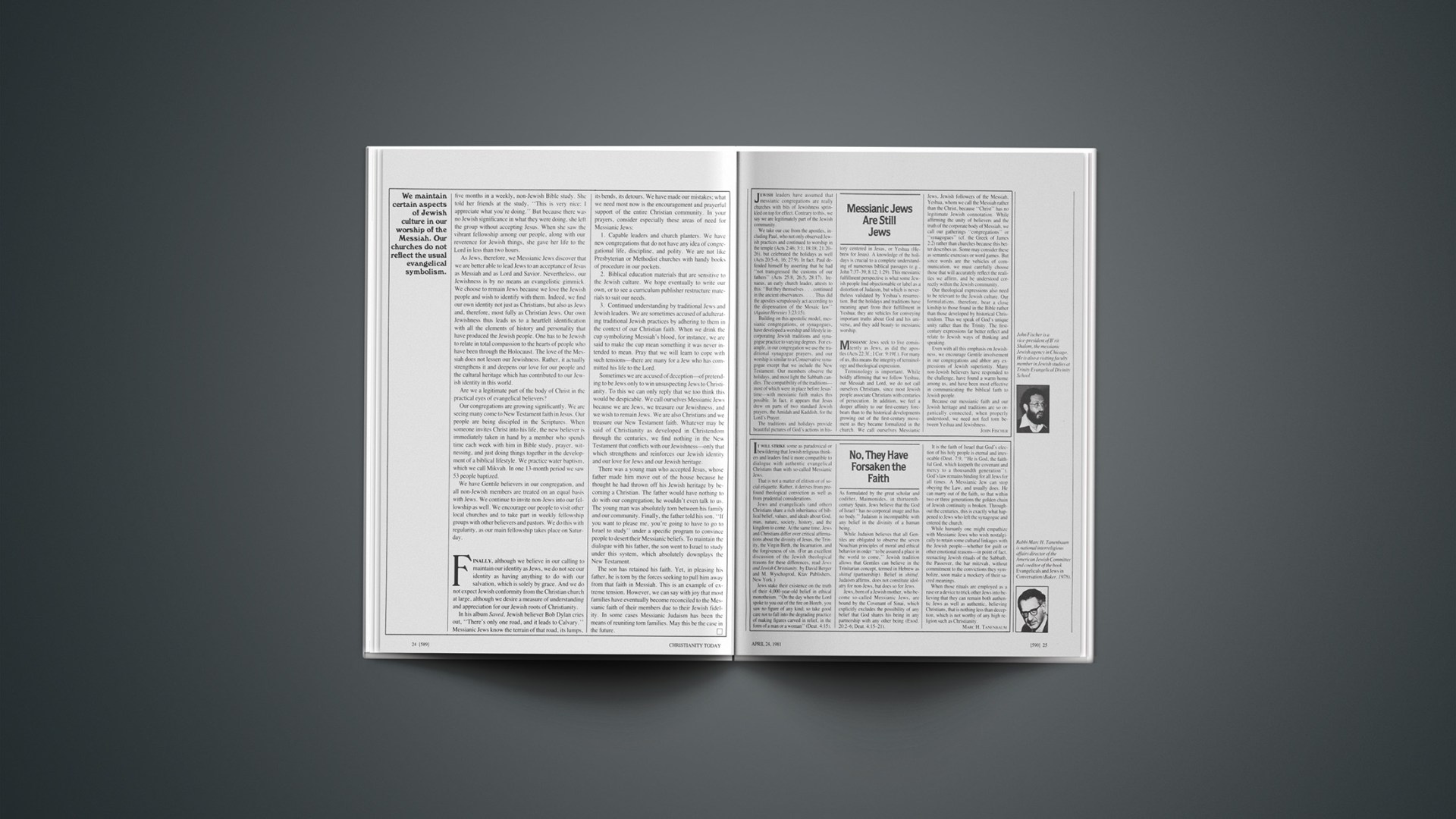Jewish leaders have assumed that messianic congregations are really churches with bits of Jewishness sprinkled on top for effect. Contrary to this, we say we are legitimately part of the Jewish community.
We take our cue from the apostles, including Paul, who not only observed Jewish practices and continued to worship in the temple (Acts 2:46; 3:1; 18:18; 21:20–26), but celebrated the holidays as well (Acts 20:5–6, 16; 27:9). In fact, Paul defended himself by asserting that he had “not transgressed the customs of our fathers” (Acts 25:8; 26:5; 28:17). Irenaeus, an early church leader, attests to this: “But they themselves … continued in the ancient observances.… Thus did the apostles scrupulously act according to the dispensation of the Mosaic law” (Against Heresies 3:23:15).
Building on this apostolic model, messianic congregations, or synagogues, have developed a worship and lifestyle incorporating Jewish traditions and synagogue practice to varying degrees. For example, in our congregation we use the traditional synagogue prayers, and our worship is similar to a Conservative synagogue except that we include the New Testament. Our members observe the holidays, and most light the Sabbath candles. The compatibility of the traditions—most of which were in place before Jesus’ time—with messianic faith makes this possible. In fact, it appears that Jesus drew on parts of two standard Jewish prayers, the Amidah and Kaddish, for the Lord’s Prayer.
The traditions and holidays provide beautiful pictures of God’s actions in history centered in Jesus, or Yeshua (Hebrew for Jesus). A knowledge of the holidays is crucial to a complete understanding of numerous biblical passages (e.g,. John 7:37–39; 8:12; 1:29). This messianic fulfillment perspective is what some Jewish people find objectionable or label as a distortion of Judaism, but which is nevertheless validated by Yeshua’s resurrection. But the holidays and traditions have meaning apart from their fulfillment in Yeshua; they are vehicles for conveying important truths about God and his universe, and they add beauty to messianic worship.
Messianic Jews seek to live consistently as Jews, as did the apostles (Acts 22:3f.; 1 Cor. 9:19f.). For many of us, this means the integrity of terminology and theological expression.
Terminology is important. While boldly affirming that we follow Yeshua, our Messiah and Lord, we do not call ourselves Christians, since most Jewish people associate Christians with centuries of persecution. In addition, we feel a deeper affinity to our first-century forebears than to the historical developments growing out of the first-century movement as they became formalized in the church. We call ourselves Messianic Jews, Jewish followers of the Messiah, Yeshua, whom we call the Messiah rather than the Christ, because “Christ” has no legitimate Jewish connotation. While affirming the unity of believers and the truth of the corporate body of Messiah, we call our gatherings “congregations” or “synagogues” (cf. the Greek of James 2:2) rather than churches because this better describes us. Some may consider these as semantic exercises or word games. But since words are the vehicles of communication, we must carefully choose those that will accurately reflect the realities we affirm, and be understood correctly within the Jewish community.
Our theological expressions also need to be relevant to the Jewish culture. Our formulations, therefore, bear a close kinship to those found in the Bible rather than those developed by historical Christendom. Thus we speak of God’s unique unity rather than the Trinity. The first-century expressions far better reflect and relate to Jewish ways of thinking and speaking.
Even with all this emphasis on Jewishness, we encourage Gentile involvement in our congregations and abhor any expressions of Jewish superiority. Many non-Jewish believers have responded to the challenge, have found a warm home among us, and have been most effective in communicating the biblical faith to Jewish people.
Because our messianic faith and our Jewish heritage and traditions are so organically connected, when properly understood, we need not feel torn between Yeshua and Jewishness.
JOHN FISCHER1John Fischer is a vice-president of B’ rit Shalom, the messianic Jewish agency in Chicago. He is also a visiting faculty member in Jewish studies at Trinity Evangelical Divinity School.










